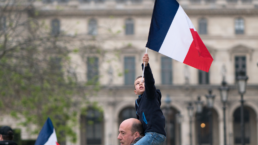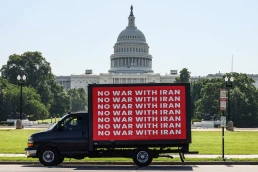France’s centrists had to ally with a powerful left coalition to halt the far right’s fiercest challenge yet.
By David Renton, Truthout
The overwhelming mood in France, following Sunday’s election, was one of relief. In the Place de la République in Paris, a crowd of New Popular Front or Nouveau Front Populaire (NFP) voters — young, clutching Palestinians flags — cheered in delight at the unexpected news. The newspaper Le Monde compared the atmosphere in poor and immigrant districts of Paris to the “thrill of victory in a World Cup final.” Pundits, opinion-formers and business leaders had all predicted a victory for the far right National Rally or Rassemblement National (RN). The assumption of such a triumph was universal — until the people spoke.
In the French parliamentary political system, the prime minister forms a government. To stay in power, it must maintain a majority in the National Assembly. For six months, polls forecasted that the RN would win the election, securing the most votes and most seats. As it happened, the National Rally failed to even come in second, leaving the election with just 143 seats out of 577 in France’s National Assembly, far short of the support it needs to govern.

The main two blocs in the National Assembly after the election will be the left-wing New Popular Front alliance with 182 seats and President Emmanuel Macron’s centrist Ensemble alliance, which won 163 seats.
The left coalition won after its constituent parties agreed to ally against the threat of an RN victory. The Socialists, Communists, Greens and France Unbowed signed on to a joint program including recognition of Palestine, control of food prices and bold environmental policies. The New Popular Front has grown during the election campaign — with new members joining its constituent parties, and vast crowds attending anti-RN rallies. France Unbowed, the furthest left party in the alliance, ran with the strategy that the people least likely to vote (the young and members of racialized minorities) were also potentially left-wing voters. Volunteers leafleted the high-rise apartments in which many Black and Arab voters and other working-class people live. Trade union federations set up regional election campaigning networks. Footballers Lilian Thuram and Kylian Mbappe let it be known that they supported the campaign against Le Pen. Turnout in the election was the highest in 40 years, and the NFP won a landslide victory among voters aged under 24.
Recent Posts
A War With Iran Would Not Be a One-Off Event But a Disastrous Ongoing Rupture
February 26, 2026
Take Action Now If Congress cedes its power to stop a war with Iran, it will fully erode any lingering promise of democratic restraint.By Hanieh…
New Addition to List of Nuclear Near Catastrophes
February 25, 2026
Take Action Now Debris flew for great distances — many times the distance of 270 meters to a nuclear reactor and nuclear storage facility.By David…
Gavin Newsom’s last budget belies his ‘California for All’ pledge
February 24, 2026
Take Action Now Yet, even as the state is poised to lose billions in federal funding, and millions of Californians are losing access to health care…
Israel and American Hawks are Pushing U.S. to Iran War With Catastrophic Consequences
February 23, 2026
Take Action Now At the World Health Assembly in May, member states may endorse an unprecedented strategy declaring that health is not a cost – but…




